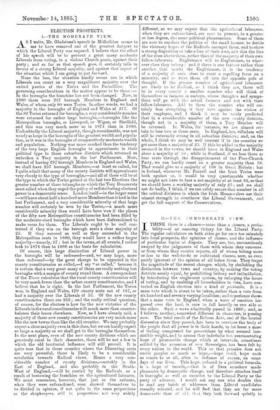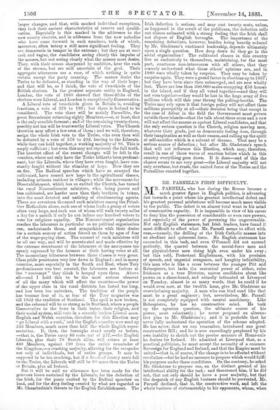11.—TH E IMMODERATE V1 EVT.
ITHINK there is a chance—more than a chance, a proba- bility—of an amazing victory for the Liberal Party. The regular calculators on both sides go for once too minutely into local prospects, the opinions of classes, and the influence of particular topics of dispute. They are, too, unconsciously swayed by the judgments of those with whom they converse, or from whom they receive reports, all of whom belong more or less to the well-to-do or cultivated classes, now, as ever. partly ignorant of the opinion of all below them. They forget the magnitude of the recent changes, which, by abolishing the distinction between town and country, by making the voting districts nearly equal, by prohibiting bribery and intimidation, by introducing the single-seat system, by enlarging the hours of voting, and by enabling all householders to vote, have con- verted an English election into a kind of plebiscite. It is a mass vote which is about to be taken, rather than a vote from six hundred and seventy varying localities; and experience shows that a mass vote in England, when a wave of emotion has passed over the land, is sure to fall heavily on one side or the other. Such a wave admittedly passed in 1880; and, as I believe, another, somewhat different in character, is passing now. The total result of the Reform Acts, and of the heated discussion since they passed, has been to convince the body of the people that all power is in their hands, to let loose a mass of feeling compressed for generations by what seemed irre- sistible weight, and to arouse that indefinite but overmastering hope of pleasurable change which at intervals, sometimes settled by the accession of new Sovereigns, has been felt by every nation in the world. This or that promise does not excite peoples so much as hope,—hope itself, hope such as comes to us all, often in defiance of reason, on some days of our lives. This hope. reduced to a political formula, is a hope of benefit,—that is, of lives somehow made pleasanter by democratic change, and therefore attaches itself in boroughs as well as counties to the Liberal Party as the party of advance. I would ask any one who doubts this to read any batch of addresses from Liberal candidates casually selected, and he will find that they are far more democratic than of al, that they look forward quietly to
larger changes, and that, with marked individual exceptions, they lack their ancient characteristics of reserve and qualifi- cation. Especially is this marked in the addresses to the new county electors, and in addresses from the new nobodies who have come forward in such numbers, both of which, moreover, often betray a still more significant feeling. They are democratic in temper in the extreme ; but they are at once rash and vague, the candidates seeing clearly the impulse of the masses, but not seeing clearly what the masses most desire. They, with their senses sharpened by ambition, hear the rush of the stream, but are still uncertain of the goal. Their aggregate utterances are a roar, of which nothing is quite certain except the party meaning. The masses desire the Tories to be defeated, as standing in the way of their hope ; and that will be, as I think, the vote of two-thirds of the British electors. In the greatest separate entity in England, London, the vote of 1880 showed that three-fifths of the electors were Liberal, and London is exceptionally Conservative.
A Liberal vote of two-thirds given in Britain is, avoiding fractions, a vote of 378 to 189; but there is Ireland to be considered. The vote there will be mainly Parnellite, the great Secessionist returning eighty Members,—or, at least, that is the only sensible forecast ; and of the remaining twenty-three, possibly not ten will be trustworthy Liberal votes. The Church gtaestion may affect a few even of them ; and we will, therefore, assign the whole Irish vote to the Tories, who even then will be defeated by a vote of 378 to 292, leaving to the Liberals, while they can hold together, a working majority of 86. This is amply sufficient ; but even this may not represent the full truth. The heaviest effect of the recent changes will be felt in the counties, where not only have the Tories hitherto been predomi- nant, but the Liberals, where they have even fought, have con- stantly fought without the stimulus of hope. Now they are on file. The Radical speeches which have so annoyed the cultivated, have roused new hope in the agricultural classes, including artisans resident in villages ; while the movement for Disestablishment, which has so excited the Church, has turned the rural Nonconformist ministers, who, being poorer and less cultivated, are harder men than their brethren in towns, into the most devoted and untiring of electioneering agents. There are seventeen thousand such ministers among the Primi- tive Methodists alone, each one of whom leads a group of voters often very large, and each one of whom will walk twenty miles a day for a month if only he can induce one hundred voters to vote for religious equality. The Nonconformist organisation reaches the labourers in particular as no political organisation can, understands them, and sympathises with their desire for a certain secrecy of action forced on them by ages of fear of the wage-paying class. The counsel of such ministers will be all one way, and will be accentuated and made effective by the extreme resentment of the labourers -at the annoyance too openly expressed by the farmers at their having votes at all. The momentary bitterness between those classes is very great. Class pride penetrates very low down in England ; and in many eimmties, more especially in the South and East, where Tory predominance was best assured, the labourers are furious at the " contempt " they think is heaped upon them. Above all—and I hold this to be the most serious element of all the many which will affect the counties—the power of the upper class in the rural districts has lasted too long, and has been too unbroken. The tradition of the people has become fear of it, as fear of the Tory magnates was till 1832 the tradition of Scotland. The spell is now broken, and the rebound will be as strong as in Scotland, where a people Conservative to the bone in their tastes, their religion, and their social system, still vote in a scarcely broken Liberal mass. English and Welsh counties, therefore, for this Election may " go Liberal with a rush," and the English counties now send up 253 Members, much more than half the whole English repre- sentation. If, then, the boroughs stand nearly as before, —that is, the Tories carry 80 seats out of 237,—the English Liberals, plus their 70 Scotch allies, will return at least 480 Members, against 190 from the entire remainder of the Kingdom,—a crushing majority, allowing for the escapades not only of individuals, but of entire groups. It may be supposed to be too crushing, but if a hundred county seats fall to the Tories, the Liberals will still be 90 more than the Tories of Britain, plus all Ireland.
But it will be said no allowance has been made for the grievous losses sustained by the Liberals, for the defection of the Irish, for the panic excited by the Radical speeches on land, and for the deep feeling created by what are regarded as Mr. Chamberlain's threats to the English Establishment. The Irish defection is serious, and may cost twenty seats, unless, as happened in the revolt of the publicans, the defection calls out classes animated with a strong feeling that the Irish shall not dispose of English boroughs. The importance of the remaining defections, however, besides being heavily reduced by Mr. Gladstone's continued leadership, depends ultimately upon a single question. How deep down do they go in the social organisation ? The cultivated classes in this country live so exclusively to themselves, maintaining, for the most part, courteous non-intercourse with all others, that they scarcely understand what those others' opinions are, and in 1880 were wholly taken by surprise. They may be taken by surprise again. They were a grand factor in elections up to 1867; but they have been since then submerged, and are now wholly lost. There are less than 300,000 males occupying £50 houses in the island, and if they all voted together—and they will not vote together—they would be lost in the huge army of five millions which will this year throng the polling-booths. The Tories may rely upon it that foreign policy will not affect these millions perceptibly at all—their decision being that except in the case of defeat in the field the Government must govern outside these islands—that the talk about three acres and a cow will not affect the masses as against Liberal candidates, and that the only serious question is the Church, religion moving men, whatever their grade, just as democratic feeling does, through their imagination as well as their reason, and calling up the spirit of self-sacrifice which is a solvent of dreams. That may be a serious source of defection ; but after Mr. Gladstone's speech that will not influence this Election, which may, therefore, result in one of those waves of emotion before which in this country everything goes down. If it does—and of this the chance seems to me very great—the Liberal majority will not only overbear, but crush, the united force of the Tories and the Parnellites counted together.







































 Previous page
Previous page